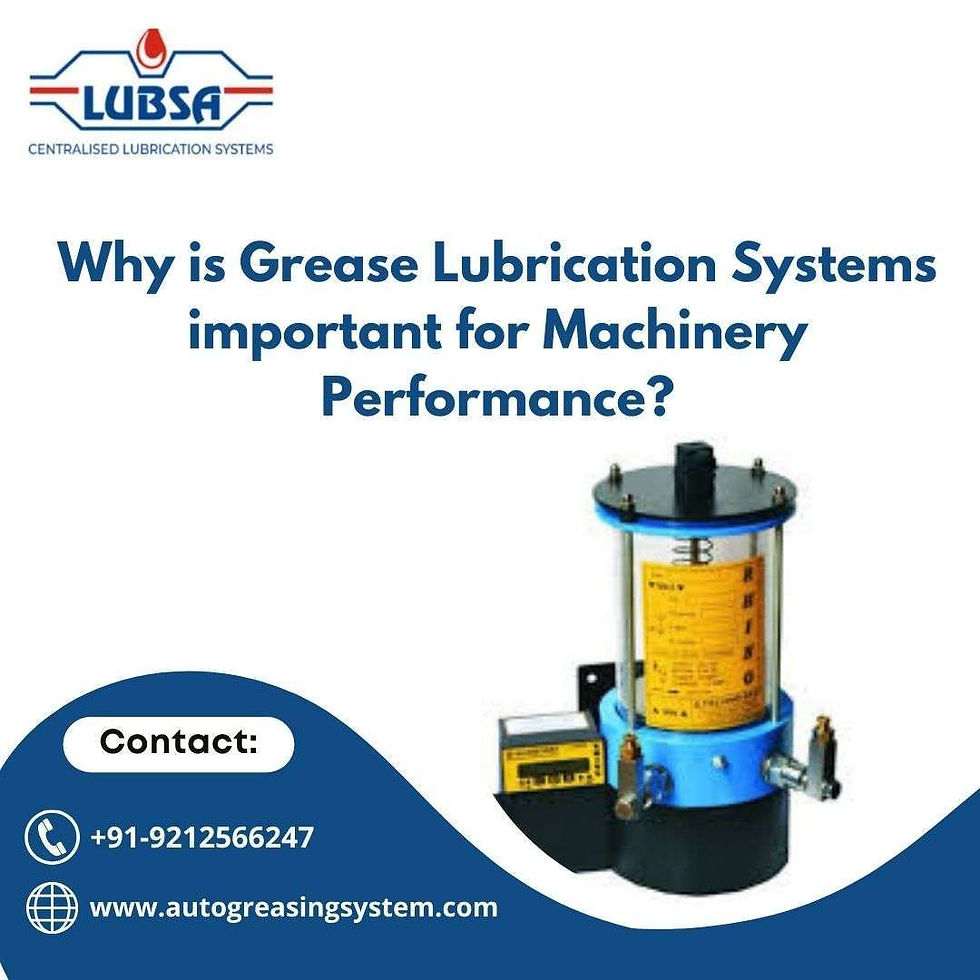The Complete Guide to Greasing Systems for Industrial Use
- Lubsa Multilub Systems
- Jul 30, 2025
- 3 min read
In the world of industrial equipment, each moving component shares a narrative — one of resistance, stress, and efficiency. Lack of adequate lubrication can lead to costly downtime, equipment failure, and safety risks. That’s where lubrication systems become essential — they act as the lifeblood of industrial machinery. Regardless of whether you work in manufacturing, mining, agriculture, or construction, it's crucial to have the appropriate Greasing Systems Supplier to guarantee seamless operations.
Let’s examine the process from setting up to enhancing industrial greasing systems and how it can revolutionize your equipment maintenance approach.

Why Greasing Systems Matter in Industrial Operations?
Automatic lubrication systems are engineered to supply exact quantities of lubricant to essential machine parts at regular intervals. In contrast to manual lubrication, these systems remove human mistakes, guarantee uniformity, and considerably prolong the lifespan of equipment.
Failing to provide lubrication may lead to overheating, rust, and early deterioration of components. Investing in a reliable system — and, even more crucially, collaborating with a reputable Grease Systems Supplier — can reduce maintenance expenses and enhance operational efficiency.
Step 1: Choosing the Right Greasing System
The initial step is to comprehend the lubrication requirements of your machinery. Elements like load, temperature, vibration, and operational setting affect the kind of greasing system needed. Different kinds are accessible:
· Parallel systems in a single line for several lubrication points.
· Double-line systems for big and intricate machines.
· High-precision applications utilizing multi-point systems.
A knowledgeable Greasing Systems Supplier will evaluate your operational setting and suggest an appropriate solution that balances cost, effectiveness, and longevity.
Step 2: Professional Installation is Key
After choosing the system, proper installation is essential. Incorrect installation may result in uneven lubrication or a complete system breakdown. Important factors to keep in mind during installation are:
· Positioning of injectors and distribution units
· Direction of grease lines to prevent blockage
· Guaranteeing alignment with current equipment
A professional setup guarantees that your greasing system operates at peak efficiency from the very start. Leading top greasing systems suppliers frequently offer on-site support, guaranteeing precision and dependability.
Step 3: Initial Calibration and Testing
Before the system becomes operational, it needs to be adjusted for accurate grease application and timing. Excessive greasing can harm seals, whereas insufficient greasing can lead to greater wear. Evaluating the system's pressure, flow rate, and reaction time guarantees that all lubrication points are sufficiently addressed.
Sophisticated greasing systems are fitted with sensors and controllers that enable operators to track performance and implement real-time modifications — a primary benefit offered by top-tier Greasing Systems Suppliers.
Step 4: Ongoing Maintenance and Monitoring
Automated systems still require regular inspections. Checks for filters, monitoring of grease levels, and performance assessments ought to be included in a planned maintenance schedule. Contemporary systems frequently connect with SCADA or PLC devices for distant observation.
Collaborating with a proactive Greasing Systems Supplier provides you with technical assistance, spare components, and system enhancements to ensure your machinery operates at optimal efficiency.
Step 5: Optimizing Maximum ROI
When the greasing system is running, optimization guarantees that you maximize the returns on your investment. This includes:
· Modifying grease schedules according to equipment operation
· Incorporating data analysis for forecasting maintenance needs
· Educating employees to understand system responses
An experienced Greasing Systems Supplier will assist your team in fine-tuning system configurations to enhance component longevity, minimize failures, and increase your facility’s efficiency.
Final Thoughts
From initial choice to everyday functioning, the efficiency of an industrial greasing system relies on the knowledge of your Greasing Systems Supplier. The proper partner can help your business reach improved efficiency, reduced maintenance expenses, and an extended lifespan for essential equipment.
When you're prepared to elevate your industrial maintenance, it's essential to partner with a reliable Greasing Systems Supplier who comprehends your industry, your machinery, and your objectives.
.jpg)


Comments